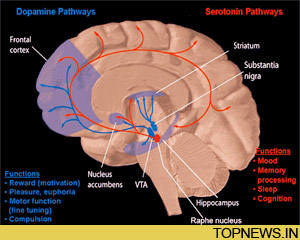Boffins identify brain region that predicts people's choices
 Washington, Mar 25: Researchers have found a brain region which predicts choices before we even know what they are.
Washington, Mar 25: Researchers have found a brain region which predicts choices before we even know what they are.
The finding may explain why people re-evaluate options after making decisions.
Researchers in the March 25 issue of The Journal of Neuroscience have reported that the activity in one brain structure can predict people''s preferences.
The study shows that even when people rate options similarly, they will choose the one that causes more activation in the caudate nucleus, a brain region involved in anticipating reward.
The study also shows that after a decision is made, caudate nucleus activity increases for the selected option and decreases for the rejected one.
In the research, researchers, led by Tali Sharot, PhD, a British Academy postdoctoral fellow at the Wellcome Trust Centre for Neuroimaging at University College London, used functional brain imaging to reach the conclusion.
The researchers imaged people''s brains as they imagined vacationing in 80 different destinations around the world. After rating how much they would like to travel to each location, participants were asked to decide between similarly rated options - for example, Greece or Thailand. Participants then imagined and rated each location again, and their brains were imaged a second time.
Participants tended to choose the location that most activated the caudate nucleus during the first imaging session. In fact, the researchers found that this brain activity, which indicates anticipated reward, could predict where the subjects chose to vacation, even when thoughts of both options were similarly pleasurable.
"In other words the part of our brain that attaches emotional significance to things actually ''likes'' the thing we are going to pick more to begin with," Hommer said.
Participants changed their evaluation of the destinations within minutes of making their decisions. For example, if they chose Greece over Thailand, they rated Greece higher and Thailand lower after the decision was made.
The researchers found that activation in the caudate nucleus changed in parallel with this reevaluation. Compared with the initial brain scans, caudate nucleus activation increased for the selected (Greece) and decreased for the rejected (Thailand) option in the second brain scan. The findings suggest a biological basis for post-choice reevaluation.
In addition to its role in anticipating reward, the caudate nucleus is involved in helping people learn classifications. The caudate nucleus is part of a brain structure called the striatum, which is involved in generating movement.
"Re-evaluating our options post-choice may serve an adaptive purpose by increasing an individual''s commitment to the action taken. In the absence of a rapid update of value that concurs with choice, we are likely to second-guess our decisions and actions," said study author Sharot. (ANI)